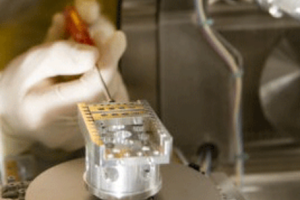



Flagship Program Materials Chain
Materials Chain is the first and largest flagship program of the University Alliance Ruhr (UA Ruhr). It offers a platform for interdisciplinary networking that brings together researchers from fundamental natural sciences to applied materials science and production technology. More than 200 scientists from more than 150 chairs and research groups from Ruhr-University Bochum, TU Dortmund University and the University of Duisburg-Essen research and teach under the umbrella of the flagship program. The profile is complemented by cooperations with 11 regional partner institutions.

Building on the proven strengths at the respective university locations, Materials Chain initiates new research projects and associations to strengthen the role of the Ruhr Area as an internationally leading research region for modern materials and their production. The interaction between researchers with different specialist backgrounds leads to new synergies and facilitates interdisciplinary collaboration in research and science between all three universities.
About the Flagship Program Materials Chain
Materials and materials science in the Ruhr Area then and now
Innovative materials have a long and successful tradition in the Ruhr area. Highly innovative products from the Ruhr Area, such as seamless railway tires, stainless steels or carbides, were growth drivers for all of Germany. The success story of automotive engineering in Germany, which continues to this day, can ultimately be traced back to developments in the material- and metal-processing industry and thus to the Ruhr Area. This historically determined focus on materials, additionally supported by natural deposits, still characterizes the university landscape of the Ruhr area today. For example, all three Ruhr Area universities, Ruhr-University Bochum, TU Dortmund University and the University of Duisburg-Essen, still have globally recognized research institutions with a focus on materials science today, at which materials are being rethought and where cutting-edge research on functional and structural materials is carried out.
Materials Chain Research
The main goal of the Materials Chain profile is an ideally continuous analysis of the entire materials chain from atom to component to bridge the gap between materials research and manufacturing technology that has been created over many years. Thus, Materials Chain research covers all phases of modern materials science, from materials design to production and refinement of materials, and to characterization and processing in the production process. This kind of research can be systematically mapped to various fields of application, such as physical and chemical energy conversion.
In recent decades, research progress and specialization in the field of materials science and technology have led to a diversification into many sub-disciplines. This is reflected in the highly specified and internationally recognized research activities at the three UA Ruhr universities and their partner institutions. From fundamental research on materials to applied technology, from the knowledge-based design of new materials to their production and processing, and from the basic description of materials at the atomic level to the properties of technical components, a large number of specialized research areas strengthen the Ruhr Area as a globally leading region of materials science and technology.
The fundamental research carried out within the Materials Chain is based on current social challenges: With state-of-the-art technologies and methods, central questions in areas such as environmental and climate protection, communication, security, medical technology and mobility of the future are solved.
In order to strengthen the paradigm shift from a phenomenological to a knowledge-based approach to the design of functional materials, Materials Chain’s research activities are focused on the adaptation of materials and the development of new processes to support component manufacturing.
Thus, the main research topics within the Materials Chain are
• adaptive and “smart” materials,
• energy conversion and storage,
• interface-dominated materials,
• Materials for communication technologies and IT, quantum computers as well as
• High performance materials for applications under extreme conditions.
Expertise in materials science and technology at the UA Ruhr universities
Ruhr-University Bochum, TU Dortmund University, the University of Duisburg-Essen and their partner institutions maintain a large number of research institutions that are recognized worldwide and use state-of-the-art technologies to carry out cutting-edge research in materials science, from the characterization of materials at the atomic level to high-performance computing.
Ruhr-University Bochum bundles its materials science activities within the interdisciplinary Materials Research Department, in which scientists from all engineering and almost all natural sciences faculties work together. This cross-faculty competence is complemented by scale-bridging materials simulations, which are carried out in the Interdisciplinary Center for Advanced Material Simulation (ICAMS) and by the research building ZGH (Center for Interface-Dominant High-Performance Materials), where highest quality infrastructure is used to research and develop new metallic, semiconducting and dielectric high-performance materials.
At TU Dortmund University, numerous institutes and chairs deal with the processing and coating of materials. Long-term, large project groups, such as DFG-funded collaborative research centers, are concerned with lightweight structures, the engineering of surfaces and resource-saving products and their technologies. The knowledge gained flows back to the materials developers in order to deliberately optimize product properties.
The outstanding materials science research activities at the University of Duisburg-Essen concentrate on the production, functionalization, characterization, and integration of nanoparticulate and nanostructured materials, which are coordinated across faculties by the Center for Nanointegration Duisburg-Essen (CENIDE). Some of these research activities take place in the research building NETZ (NanoEnergieTechnikZentrum). With the help of the unique infrastructure of the DFG Device Center Interdisciplinary Center for Analytics on the Nanoscale (ICAN), effects can be investigated on the smallest size scales. The area of materials simulation is covered by the Center for Computational Sciences and Simulations (CCSS).
Additionally, there is a large number of coordinated projects at all Materials Chain locations, such as DFG-funded collaborative research centers, international graduate schools and other large projects, some of which are already organized across locations.


